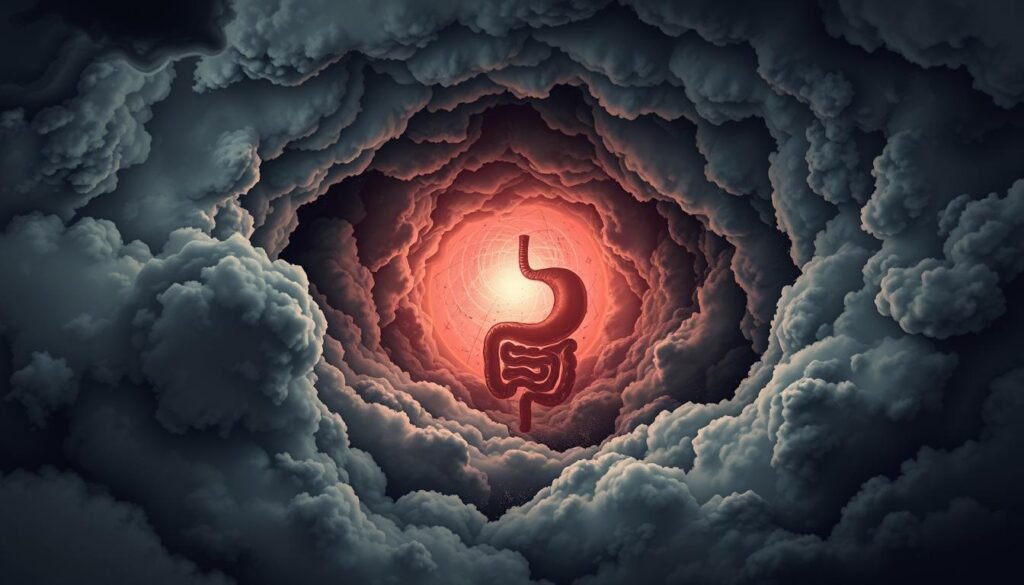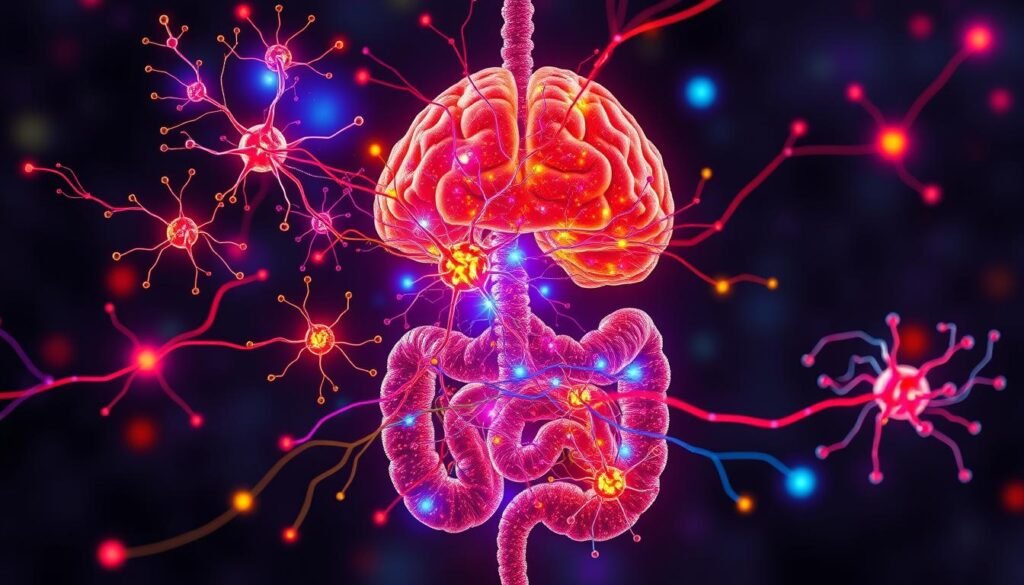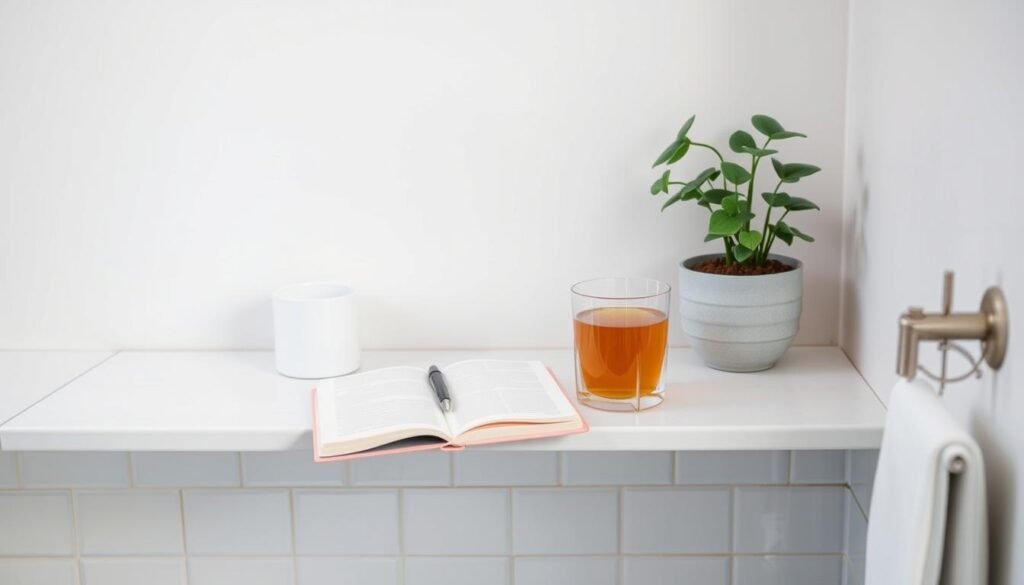A large portion of people, up to 30% to 40%, face functional bowel problems sometime. This fact highlights the link between anxiety diarrhea and our digestive wellness. It shows us how our feelings, especially anxiety, can mess with our stomach and cause issues.
Studies have shown that trouble in our stomach can alert our brain, changing our mood and mental state. Many people with irritable bowel syndrome (IBS) also feel more anxious and depressed. This ties our brain’s health closely with our gut’s condition.
To tackle these issues, learning to manage stress can really help. Techniques like mindfulness and cognitive behavioral therapy show promise. They can ease anxiety symptoms and make our gut healthier. For tips on handling stress better, check out these strategies for more info.
Key Takeaways
- Anxiety diarrhea affects up to 30% to 40% of the population.
- The gut-brain connection significantly impacts emotions and digestive health.
- Many individuals with IBS also experience anxiety and depression.
- Mind-body techniques can effectively manage symptoms of anxiety and bowel disorders.
- A healthy gut microbiome is essential for mental well-being.
- Understanding stress management can lead to improved digestive health.
The Gut-Brain Connection Explained
The gut-brain connection is a complex link between our gut and brain. It’s mainly through the enteric nervous system (ENS). This system acts as a network of nerves in our digestive tract. Understanding it shows us how our emotions can affect our gut health.
Understanding the Enteric Nervous System
The enteric nervous system is called the “second brain.” It has over 100 million nerve cells in our gut. These cells talk directly with our brain, creating the gut-brain axis. This connection doesn’t just control digestion; it also impacts our mood and emotions. When this system faces problems, it can lead to gut issues like IBS and stress-related digestive problems.
Role of the Vagus Nerve in Digestion and Emotions
The vagus nerve is the main link between the enteric and central nervous systems. It’s vital for sending signals about digestion and emotions. When we’re stressed, the vagus nerve sends these feelings, affecting our digestion. This can cause nausea and stomach cramps. It highlights why it’s important to understand the link between our emotions and gut health.
| Aspect | Description |
|---|---|
| Enteric Nervous System (ENS) | A network of over 100 million nerve cells in the gastrointestinal tract that communicates with the brain. |
| Vagus Nerve | The main nerve pathway linking the ENS to the central nervous system, influencing emotional signals and digestion. |
| Gut-Brain Axis | A bidirectional communication system connecting the brain and the digestive system, impacting both mental and gastrointestinal health. |
What is Anxiety Diarrhea?
Anxiety diarrhea occurs when stress affects your digestion. It’s important to see how mental health can influence your stomach issues. This part explains how stress can lead to bowel problems and the role of anxiety in this process.
Defining Stress-Induced Bowel Disorders
Stress-induced bowel disorders are stomach issues linked to emotional stress. Conditions like irritable bowel syndrome (IBS), especially IBS with diarrhea (IBS-D), are common. About 75% of people with IBS-D also deal with anxiety and depression. This shows how closely tied anxiety and stomach health are, and the impact it has on wellbeing.
How Anxiety Triggers Digestive Disturbances
Anxiety affects your stomach, leading to issues like more bowel movements. When stressed, your body prepares to either fight or flee. This response speeds up your heart rate, raises blood pressure, and slows digestion. So, food moves too fast through your gut, causing diarrhea. Long-term, this can prevent your body from getting nutrients and lead to tiredness. When anxious, you might also feel nauseous and cramped.

It’s crucial to handle the anxiety behind these bowel problems. Treatments range from medicines to lifestyle adjustments. Things like antidiarrheals and probiotics can ease symptoms. Therapy and relaxation can also boost your digestive health. If your symptoms, like long-lasting diarrhea, are severe, see a doctor for the right care.
Common Symptoms of Anxiety-Related Gastrointestinal Issues
Anxiety can show up in our guts. It often causes symptoms linked to emotional distress. Knowing these symptoms and their effects is key.
Emotional Turmoil and Digestive Problems
Feeling stressed can mess with your stomach. Anxiety may lead to nausea, cramps, and changes in how often you go to the bathroom. It’s important to see the link between your feelings and gut health.
Identifying Panic Attack Diarrhea
Panic attacks can suddenly upset your stomach, causing urgent diarrhea. It feels different from other kinds because you urgently need a bathroom. Learning about it helps you handle your anxiety better.
Nervous Stomach Diarrhea as a Reaction to Anxiety
Stress can also cause nervous stomach diarrhea, leading to loose stools in tense moments. It usually happens right when you’re stressed. Knowing this allows you to use techniques that lower stress, making these episodes less frequent.
The Biological Mechanism Behind Anxiety Diarrhea
Anxiety creates distressing physical effects, including diarrhea. The reasons for this involve biological mechanisms related to hormones and gut health. Knowing these factors helps those with mental health-related digestive issues.
Hormonal Changes During Stress
Stress leads to different hormonal changes. It releases hormones like cortisol and adrenaline. These prepare the body for ‘fight or flight,’ affecting digestion.
This state increases digestion speed, causing symptoms like diarrhea. The interaction between stress hormones and the gut shows the complexity of this relationship. It’s a cycle where stress worsens gut issues, proving the importance of understanding these biological mechanisms.
Impact of Gut Microbiome on Mental Health
The gut microbiome is key for mental health. A healthy gut promotes wellness, but imbalances can cause anxiety and digestion problems. Studies show that bad gut health boosts stress responses. This can worsen mood and lead to issues like IBS.
IBS affects about 11.2% worldwide, linking closely with psychiatric disorders like anxiety. With 40% to 60% of IBS patients having mental health issues, the gut-brain connection is clear. Managing both anxiety and gut health is crucial, often needing professional help. For more on anxiety and digestion, check this resource.

| Condition | Prevalence | Psychiatric Disorders |
|---|---|---|
| IBS | 10-15% of North Americans | 54-94% in treatment-seeking |
| Anxiety Disorders | 61% in IBS Patients | Significantly higher than general population |
| Life Traumas Preceding IBS | Reported 38 weeks prior | Commonly linked with IBS onset |
Managing Anxiety Diarrhea Effectively
Anxiety diarrhea can be troubling. It affects your body and mind. Learning to manage it can bring a lot of relief. Making changes to your lifestyle and reducing stress helps you feel better.
Lifestyle Modifications for Relief
Changing what you eat is key to control anxiety diarrhea. Choose foods that are easy on the stomach like bananas, rice, and toast. It’s vital to drink plenty of water. This is because diarrhea can make you lose a lot of fluid. Avoid drinks with caffeine and foods that are greasy. They can make your symptoms worse.
Working out regularly can improve your mood and your gut health. Endorphins, or “happy hormones,” are released during exercise. Eating at the same times every day can also keep your digestion on track. You can find more tips on managing anxiety diarrhea effectively here.
Mind-Body Techniques for Stress Reduction
Add stress-busting activities to your daily routine. This can help reduce anxiety-related symptoms. Yoga, meditation, and deep breathing are great for calming the mind. Knowing what makes you stressed helps you find ways to cope. Therapy, like cognitive behavioral therapy (CBT), addresses harmful thinking. It can greatly reduce your symptoms.
When to Seek Professional Help
Not all cases of diarrhea need a doctor’s care. But it’s important to get help if your symptoms don’t go away or get worse. If you have severe pain, are getting dehydrated, or see blood in your stool, see a doctor right away. Doctors may suggest over-the-counter meds, like IMODIUM®, to normalize bowel movements. Sometimes, you might need different treatments or holistic approaches.
Knowing when to ask for help is a big step in dealing with anxiety diarrhea effectively.

The Importance of a Healthy Gut for Mental Wellness
A healthy gut is key for mental wellness. It helps in processing feelings and mood regulation. Probiotics are great for boosting mood and reducing anxiety.
These helpful bacteria support good digestion. They also affect brain chemicals, helping to ease stress and anxiety.
Probiotics and Their Effects on Mood
Studies show probiotics can have a positive impact on mental health. They promote a healthy gut environment, which is crucial for producing neurotransmitters like serotonin.
Eating foods rich in probiotics, such as yogurt, kefir, and fermented veggies, helps maintain gut balance. This, in turn, supports emotional stability and stress management.
Dietary Changes to Alleviate Symptoms
Eating certain foods can improve gut health. High-fiber foods like fruits and veggies help digestion.
Omega-3s, found in fatty fish and walnuts, reduce anxiety by fighting inflammation. Proteins from chicken and fish boost serotonin, improving mood. Making these dietary changes can greatly improve emotional health.
Connection Between Anxiety and Functional Gastrointestinal Disorders
Anxiety affects our bodies in many ways, especially our digestion. It’s linked to conditions like irritable bowel syndrome (IBS). This shows how our mind and body connect, often making each other’s symptoms worse.
Understanding Irritable Bowel Syndrome (IBS)
IBS is a common problem that affects your digestion. It leads to stomach pain, bloating, and changes in how often you go to the bathroom. People with IBS often feel more anxious, which makes their symptoms worse. A study by Keightley in 2016 found these people also have more signs of depression over time. So, treating anxiety and IBS together is key to feeling better.
Exploring the Link Between Mental Health and Gastrointestinal Disorders
Your mental health plays a big role in your gut health. Stress and worry can make digestive issues like IBS worse. Our gut bacteria are important here, affecting our mood and how our digestive system works. Improving our mental health and taking care of our gut can lead to feeling better overall.
Research and Future Directions in Gut-Mind Studies
The study of the gut-brain link is showing new insights, especially for anxiety treatment. It looks at how our mental health connects with our gut bacteria. Recent findings suggest changes in gut bacteria can influence our mood and thinking.
This discovery leads to new treatment ideas for anxiety symptoms.
Emerging Therapies for Gut-Related Stress Symptoms
The role of gut bacteria in mental health is becoming clearer. Treatments like probiotics, changing our diet, and fecal transplants are now considered for anxiety. These approaches are thought to rebalance the gut and make us feel better.
They target the root causes of chronic stress and gut problems.
Current Studies on the Gut Microbiome and Anxiety
Research is focusing on how certain gut bacteria affect anxiety. It shows that these bacteria can influence brain flexibility, affecting disorders like PTSD and OCD. Looking into how gut bacteria produce brain chemicals offers hope for new anxiety treatments.
Exploring this complex relationship could change how we approach anxiety.
| Therapy Type | Description | Potential Benefits |
|---|---|---|
| Probiotics | Live microorganisms providing health benefits when consumed | May enhance mood and cognitive function by restoring gut balance |
| Dietary Modifications | Adjustments to nutrient intake aimed at optimizing gut health | Improvement in symptoms related to anxiety and depression |
| Fecal Microbiota Transplantation | Transfer of gut microbiota from a healthy donor to a recipient | Potential to restore gut health and alleviate anxiety symptoms |
As science advances, focusing on the gut-mind link is key for creating better anxiety treatments. The deep connection between our gut bacteria and mental health opens exciting possibilities. Insights from recent research highlight the importance of including the gut in anxiety treatment plans.
Conclusion
Looking into anxiety diarrhea shows the link between our minds and gut health. Research found that 24.5% of people with anxiety often have chronic diarrhea. This is a lot compared to 9.1% of people without anxiety. It shows how our feelings can affect our stomach health.
Getting the right treatment is key. But, only about 36.9% of those suffering from anxiety and gut problems ask for professional advice. Changes in diet and stress-reducing activities like meditation can help. Cognitive behavioral therapy and probiotics also support managing anxiety and its effect on the gut.
Understanding the gut-mind relationship is getting more attention. It’s vital for people to know about their gut health and seek out treatment. With support and taking care of oneself, dealing with anxiety diarrhea and improving mental and digestive health is possible.